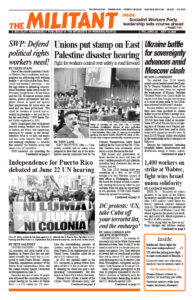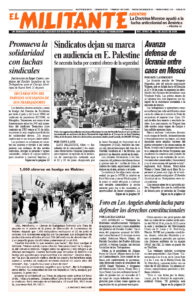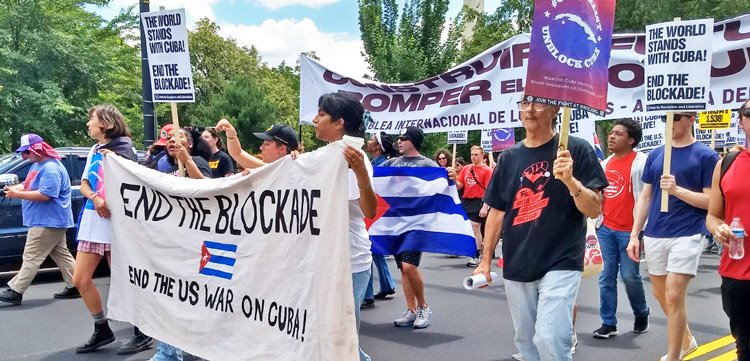WASHINGTON — An evening forum and a rally at the White House were featured activities June 24 and 25 to demand an end to the six-decade-long economic war against Cuba. They were part of several days of coordinated activities here and in several U.S. and Canadian cities focusing on a call to remove Cuba from Washington’s outrageous and punitive “State Sponsors of Terrorism” list.
Some 100 people participated in the June 24 program sponsored by the DC Metro Coalition in Solidarity with the Cuban Revolution demanding an end to the U.S. blockade against Cuba.
The next day more than 250 people marched and protested at the White House. Several days of lobbying at congressional offices were also organized.
The Joseph Biden administration “has been in office for more than two years, and there are no indications it is following a different policy toward Cuba compared to [former President Donald] Trump,” featured speaker Alejandro Pila, deputy chief of mission at the Cuban Embassy here, told the meeting.
“The state sponsors of terrorism designation has a direct effect on the Cuban economy,” Pila said. Together with the embargo and other measures aimed at cutting off all trade and financial transactions between Cuba and other countries, “Cuba is going through difficult times.”
The U.S. ruling class has never forgiven the people of Cuba for making and defending their socialist revolution. Washington’s economic war on Cuba began in 1960, and it has been maintained by every U.S. president since, Democrat and Republican alike.
Pila quoted Cuban revolutionary leader Fidel Castro. “The world has extended solidarity to Cuba, and that’s why we feel more and more solidarity with all the peoples of the world,” Castro said in 1961. “The solidarity we have received has helped make it possible for us to resist imperialism’s assaults,” and with that support “we will continue fighting and resisting.”
Rev. Brian Hamilton, pastor of Westminster Presbyterian Church, welcomed the audience. The program, chaired by Netfa Freeman of the Black Alliance for Peace, opened with a showing of the video “Maestra,” a short and excellent documentary about the 1961 Cuban literacy campaign directed by Catherine Murphy.
The video captures the mass, working-class character of the mobilizations that in under a year eliminated illiteracy in Cuba. Some 100,000 volunteers, mostly teenagers and the majority young women, traveled to the countryside where they got an education in the unfolding revolution from the rural workers and peasants as they taught them to read and write.
Calla Walsh, a co-chair of the NNOC, pointed to the importance of denouncing the latest assault against Cuba by the U.S. government — fake charges of a secret agreement between Beijing and Cuba to install a Chinese espionage station on the island. “This is another example of U.S. propaganda to justify the blockade and distract from the fact the U.S. maintains a military base on Cuban soil in Guantánamo,” she said.
Also speaking were Chris Smalls and Tristan Dutchin, leaders of the Amazon Labor Union, and Kamau Benjamin, a leader of the DC Metro Coalition. Cultural performances added to the evening.
March to the White House
The Sunday march and rally drew people from across the Northeast, including a busload from New York, and carloads from Detroit; Columbia, South Carolina; and other cities. Banners and T-shirts identified participants from local Cuba solidarity coalitions, IFCO-Pastors for Peace, Young Communist League, Party for Socialism and Liberation, Socialist Workers Party, African People’s Socialist Party and others.
Roberto Yis is an Uber driver and member of Puentes de Amor and the Alianza Martiana, Cuban organizations in Miami that call for lifting U.S. sanctions. A large number of Cubans have immigrated to the U.S. from Cuba in recent years due to the difficult economic conditions there, he said. As they learn “the reality of capitalism, there is more openness to discussion.”
A dozen Peruvians from New York and Washington joined in the rally. They are part of Semillas de Libertad (Seeds of Freedom), a group that defends immigrant workers and has protested the current Peruvian government’s violent assaults on political protests.
“Cuba is part of Latin America, which the U.S. sees as its backyard,” Delia Aguilar said. “But they have a right to their revolution without interference.”
A contingent from the African People’s Socialist Party, which is fighting frame-up charges by the Biden administration against APSP Chairman Omali Yeshitela and Uhuru Movement leaders Penny Hess and Jesse Nevel, marched. The three were indicted in April on charges of conspiring to act as unregistered agents of the Russian government. They face up to 15 years in prison.
Spencer Cortesi and Riley Koehler, high school students from Fairfax, Virginia, decided to come to the rally after hearing a podcast on Cuba. “Cuba is the one revolution that has not been undone by U.S. imperialism and remains true to its principles,” Cortesi said.
Candace Wagner contributed to this article.


